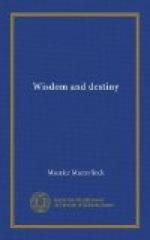then have thought it of service to beckon to death
as the daughter of Oedipus issued from the doorway
of Creon’s palace? It was, therefore, solely
because of the strength of her soul that destiny was
able to triumph. And, indeed, it is this that
consoles the wise and the just—the heroes;
destiny can vanquish them only by the good she compels
them to do. Other men are like cities with hundred
gates, that she finds unguarded and open; but the
upright man is a fortified city, with the one gate
only—of light; and this gate remains closed
till love be induced to knock, and to crave admission.
Other men she compels to obey her; and destiny, doing
her will, wills nothing but evil; but would she subdue
the upright, she needs must desire noble acts.
Darkness then will no longer enwrap her approach.
The upright man is secure in the light that enfolds
him; and only by a light more radiant still can she
hope to prevail. Destiny then will become more
beautiful still than her victim. Ordinary men
she will place between personal sorrow and the misfortune
of others; but to master the hero or saint, she must
cause him to choose between the happiness of others
and the grief that shall fall on himself. Ordinary
men she lays siege to with the aid of all that is
ugly; against the others she perforce must enlist
whatever is noblest on earth. Against the first
she has thousands of weapons, the very stones in the
road becoming engines of mischief; but the others
she can only attack with one irresistible sword, the
gleaming sword of duty and truth. In Antigone’s
story is found the whole tale of destiny’s empire
on wisdom. Jesus who died for us, Curtius who
leaped into the gulf, Socrates who refused to desist
from his teaching, the sister of charity who yields
up her life to tending the sick, the humble wayfarer
who perishes seeking to rescue his fellows from death—all
these have been forced to choose, all these bear the
mark of Antigone’s glorious wound on their breast.
For truly those who live in the light have their magnificent
perils also; and wisdom has danger for such as shrink
from self-sacrifice, though it may be that they who
shrink from self-sacrifice are perhaps not very wise.
48. Pronounce the word “destiny,”
and in the minds of all men an image arises of gloom
and of terror—of death. In their thoughts
they regard it, instinctively, as the lane that leads
straight to the tomb. Most often, indeed, it
is only the name that they give unto death, when its
hand is not visible yet. It is death that looms
in the future, the shadow of death upon life.
“None can escape his destiny” we often
exclaim when we hear of death lying in wait for the
traveller at the bend of the road. But were the
traveller to encounter happiness instead, we would
never ascribe this to destiny; if we did, we should
have in our mind a far different goddess. And
yet, are not joys to be met with on the highways of
life that are greater than any misfortune, more momentous




